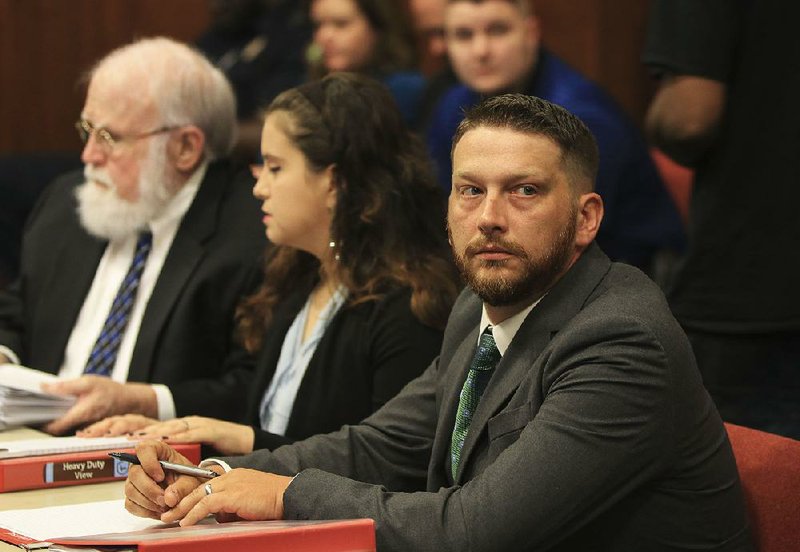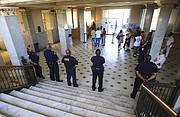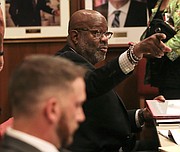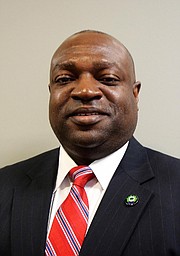Mayor Frank Scott Jr. pressured the Little Rock Police Department to swiftly investigate and fire an officer after a fatal on-duty shooting earlier this year, a department administrator said Thursday during a public hearing.
Assistant Chief Hayward Finks said during former officer Charles Starks' appeal before the Civil Service Commission that Scott's push for swift judgment forced the department to conduct an internal investigation into the shooting of Bradley Blackshire faster than it normally would.
Starks is seeking to get his job back.
Finks said he and Assistant Chief Wayne Bewley, who was acting as police chief at the time, discussed the mayor's actions on several occasions.
"There were a lot of things that were either rushed or not completed because of pressure from Mayor Scott from the very beginning to do this investigation quickly and to, in his opinion, fire Starks as quickly as possible," Finks said.
Finks was the second assistant chief to mention Scott's involvement in the investigation. Assistant Chief Alice Fulk said Scott asked on Feb. 22, the day Blackshire was fatally shot, if Starks could be immediately fired.
Asked after Thursday's hearing whether he was aware of any pressure from the mayor's office to complete the investigation quickly, Police Chief Keith Humphrey told the Arkansas Democrat-Gazette that he was.
"I had heard that from officers," Humphrey said. "It happened before I got here. The investigation concluded before I was hired, but I've talked to my officers to tell them I was not aware of it at first."
[Video not showing up above? Click here to watch » https://www.youtube.com/watch?v=Z2Zya2srIyc]
Scott said Thursday evening that he would not comment on an ongoing Civil Service Commission hearing. His spokeswoman, Stephanie Jackson, told the Arkansas Democrat-Gazette previously that the mayor has no authority over the Police Department's internal hiring or firing choices.
"The mayor did not tell Chief Humphrey to terminate officer Starks," Jackson said May 6, the day Starks was fired. "Nor did he influence that decision."
Starks' appeal was scheduled to conclude today but was postponed Thursday evening after Starks' attorney, Robert Newcomb, was injured in a fall down the stone, front stairway at City Hall. Newcomb had to seek medical attention and left the building with his arm in a sling.
The hearing had not been rescheduled as of Thursday night, said Stacey Witherell, director of the city's Human Resources Department.
More than 90 people gathered Thursday in the City Hall boardroom where the Police Department defended its decision to fire Starks, who was terminated after being cleared of criminal charges April 19.
Starks fired his weapon 15 times at a moving vehicle driven by Blackshire on Feb. 22 during a traffic stop. Starks was struck by the slow-moving vehicle before shooting four times and moving in front of the car, which rolled forward causing Starks to fall on the vehicle's hood and injure his knee.
Each of the six witnesses who testified Thursday said the actions that led up to the death of the 30-year-old Little Rock man came down to one thing: a judgment call.
Wayne Kelly, a 23-year veteran of the department, worked for 14 years in the department's training academy. Attorneys for the city and Starks asked whether Starks' actions during the shooting complied with department procedure.
Although Kelly said he would not have positioned his car in front of the stolen vehicle that Starks was investigating, he included the caveat that the situation in which Starks found himself did not align well with any of the department's training scenarios.
"I just need some direction on what should he have done differently?" commission member Cara Boyd-Connors said. "Pursuant to what policy or training would you have performed in this scenario?"
Kelly said he could not think of a specific policy that should have dictated Starks' actions.
"Are you just going off of your instinct and judgment in that call?" Boyd-Connors asked.
"Yes," Kelly responded.
During his testimony, Starks said he shot Blackshire because he feared he "was going to be run over, shot or both."
Humphrey, however, said Starks' actions exacerbated an already tense scene.
"Approaching that vehicle the way that he did escalated the situation," Humphrey said. "There was time to wait, and there were other steps that could have been taken."
Starks testified for more than 90 minutes Thursday while sitting fewer than 15 feet from Blackshire's mother, Kimberly Blackshire-Lee. It was the first time the two had been in the same room.
Before introducing witnesses, attorneys for both sides played dashboard-camera footage from the shooting. The video was played over and over throughout the day as lawyers asked questions about the car's position, Starks' and Blackshire's words, and where Starks stood while he fired his weapon.
Starks fidgeted in his seat as the video played, moving his index finger back and forth over his thumb. Blackshire-Lee walked out of the room before the video reached the point of her son's death.
On Thursday, when the video reached the point where Starks began firing his weapon, Starks put his fingers on the bridge of his nose and looked down.
"The city wants to ruin this man's career, and I'm not saying Mr. Blackshire's death was not something that his family suffers from. It's a tragedy," Newcomb said in his opening statement. "But somebody said to me, all Mr. Blackshire had to do to be alive is get out of the car. But he may not have wanted to because he had four felonies and was awaiting trial."
During more than nine hours of testimony, multiple Little Rock police officials contradicted one another and their interpretations of department policies.
Humphrey found that Starks had twice violated a policy that states in part that an officer must not step in front of a moving vehicle. Finks said Starks had violated no policies, saying he interpreted the policy to mean an officer must not willingly stand in the way of a moving vehicle with the intention of making a car stop, thereby causing a deadly-force situation.
In his opening statements, the Police Department's legal representative Khayyam Eddings said Starks placed himself in a dangerous situation.
"In this case the testimony will show that officer Starks voluntarily placed himself in the path of a vehicle that turned in his direction," Eddings said. "He continued to put himself in danger."
Commission member Obray Nunnely said he'd considered one question for much of the hearing: What was the urgency in Starks pulling up to the vehicle immediately instead of waiting for backup?
"He dictated the urgency when he didn't comply, had a 1,000-yard stare and led me to believe he was on narcotics," Starks replied after Nunnely addressed the question to him. "The urgency of me knowing, due to my training and experience, that I switch from 'I need to get this guy out of the car' to 'I need to get my butt to cover because I don't want to be shot.'"
The hearing grew tense at times, with attorneys' and witnesses' voices getting louder and louder in the crowded room. When Humphrey said he couldn't predict what would have happened if Starks hadn't fired his weapon, Newcomb turned away from him.
[Video not loading? Click here to watch » https://www.youtube.com/watch?v=vMj5QyAW9Hc]
"I'll save that question for one of the other officers who possibly has more experience than the chief in this situation," Newcomb said.
The crowd gasped, and when Humphrey spoke again his voice was low.
"Mr. Newcomb ... please," he said.
While Finks was on the stand, Mike Moore, one of the department's attorneys, demanded that the assistant chief look him in the eyes when he spoke to him. For the rest of the testimony, Finks stared directly at Moore and would read only from the provided documents when Moore specifically asked him to look down.
For the duration of the hearing, three to four armed police officers sat next to the door. Two more were outside the boardroom. In the downstairs lobby, five officers were stationed next to the entrance. Groups of three to four officers were spread out across City Hall, including near the back entrance and near the Human Resources Department.
At 12:22 p.m. the Police Department received a call about shots being fired at City Hall, spokesman Michael Ford said. Officers found nothing to indicate that the report was true, Ford said.
A Section on 07/26/2019



